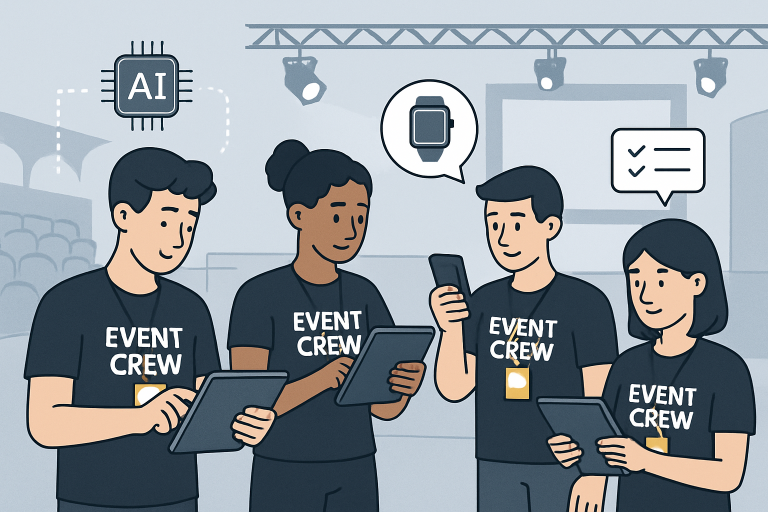Table of Contents
Introduction
Success in today’s event industry hinges on efficient, forward-thinking crew management strategies. As expectations rise and events become increasingly complex, planners must integrate technology, foster engagement, and operate sustainably. Relying on established expertise, such as that offered by Phoenix Crewing Services, is vital for event organizers who want to stay ahead of the curve. By merging skilled personnel with innovative management techniques, events can achieve unprecedented quality and attendee satisfaction.
Smart crew management is no longer just about having the right staff in the right place—it’s about leveraging digital tools to orchestrate seamless operations. Whether coordinating large concerts, corporate gatherings, or immersive exhibitions, visionary leaders utilize expert crewing partners to ensure every logistical detail aligns with their creative vision. The following approaches highlight how event teams can foster more collaborative, data-driven, and sustainable event environments.
Integrating AI and Automation
Artificial Intelligence (AI) and automation are rapidly transforming the core of event operations. AI can analyze complex schedules, match shifts to specific competencies, and predict future staffing needs. Automated check-in systems, such as QR code scanning and biometric identification, minimize wait times and reduce human error. These innovations can help free up staff to focus on creating memorable guest experiences rather than time-consuming manual tasks. In fact, major event producers are implementing AI chatbots for registration, real-time event updates, and attendee inquiries, streamlining communication in real-time. For a deeper understanding of the latest advancements in AI for workforce management, a recent study explores how AI agents are reshaping the labor market and the future of work.
Embracing Immersive Technologies
Virtual Reality (VR) and Augmented Reality (AR) add a new dimension to events, blurring the line between digital and physical worlds. Organizers can use VR for virtual walkthroughs of venues during planning stages or enable remote participation from attendees who cannot be present in person. AR overlays, such as interactive maps and mobile guides, enrich live experiences by helping guests navigate and engage with sponsors or exhibits. These engaging technologies are captivating and can provide invaluable analytics for attendee engagement and movement patterns.
Prioritizing Sustainability
Modern event organizers are increasingly focused on reducing their ecological footprint. Sustainable crew management emphasizes paperless communications, digital ticketing, and energy-efficient lighting setups. It also means training staff to manage green initiatives—from recycling programs to sustainable catering. For instance, having a crew oversee properly labeled waste stations can make recycling easier for attendees. This growing movement is widely covered in major outlets; a recent article discusses the shift towards sustainability in large-scale productions.
Leveraging Data Analytics
Big data is shaping the future of event planning and continuous improvement. Analytics tools monitor everything from check-in times to session attendance, helping organizers adapt to guest preferences in real-time and post-event. By studying attendee behavioral patterns and feedback, planners can refine event layouts, prioritize popular activities, and allocate staff where needed. Data-driven insights enable efficient resource use and maximize ROI for organizers and sponsors.

Enhancing Attendee Engagement
Tech-forward engagement tools like live polling, real-time Q&A, and interactive games have become staples at leading industry events. These innovations foster authentic connections with the audience and provide immediate feedback to organizers. For example, app-based gamification ranks attendees by engagement, incentivizing participation and networking. Such tools enrich the experience and generate vital metrics to improve future events.
Implementing Wearable Technology
Wearable technologies, such as NFC-enabled wristbands and smart badges, are streamlining everything from entrance control to session tracking and cashless payments. Attendees benefit from fewer lines, effortless networking, and targeted notifications, while organizers gain insights into crowd flow and dwell times within the venue. Monitoring real-time data from wearables helps manage security and optimize staff deployment during peak periods. Major conferences and expos have already adopted these devices, further validating their effectiveness.
Fostering Personalization
Personalized event experiences are an essential differentiator in a crowded market. AI-powered platforms can suggest customized agendas and send reminders for sessions that match each attendee’s interests. This level of curation increases satisfaction and engagement while fostering loyalty. From personalized swag to targeted notifications, today’s events must embrace technology that recognizes the individual among the crowd. For more insight into personalization trends, a recent article analyzes how personalization boosts engagement and business outcomes.
Conclusion
The key to exceptional event outcomes is combining technological innovation with service excellence. By adopting strategies, event professionals can seamlessly blend human expertise with digital efficiency. Integrating AI, embracing immersive experiences, prioritizing sustainability, harnessing data, deploying wearables, and personalizing engagement collectively pave the way for memorable events. Evolving alongside technology ensures that event teams meet—and exceed—ever-changing attendee expectations.


